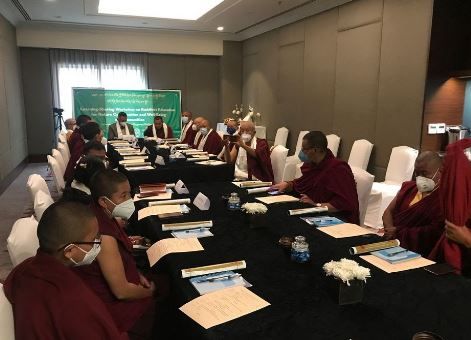4 years ago

Buddhism is an animal-friendly religion, some aspects of the tradition are surprisingly positive about animals. On other hand Nepal has rare animals confined to their prime habitats.
Such species as leopards, spotted deer, Himalayan tahr, blue sheep and others are commonly seen in the wild of Himalayan Region.
For preservation of those rare species the World Wildlife Fund has done a series of collaborations with masters of Himalayan Region aka Lama.
Teachers Training workshop on wildlife and nature conservation was completed on March 15.
The Nepal Buddhist Federation, in coordination with the World Wildlife Fund (WWF Nepal), has conducted a three-day Teachers training program for lamas and monks on wildlife and environment protection through Buddhist education. WWF Nepal was Founded in 1993 with more than hundred staff working now.
In the three-day training program organized in Kathmandu, 14 research papers were presented. Topics related to environment and wildlife were facilitated by trainers from the World Wildlife Fund.
On other hand topics related to Buddhist education were facilitated by Buddhist philosophers.
Previously on February 25, a one-day workshop on conservation of wildlife and nature through Buddhist education for the welfare of the local people was concluded in coordination with WWF Nepal.
Six research papers were presented at the workshop presided by chief guest Mr.Fupu Chhembe Sherpa (Geshe Thupten Jigdol), Chairman of the Buddhist Philosophy Promotion Committee and Gumba Development Trust at the Taragaon, Hyatt Hotel.
On behalf of the Nepal Buddhist Federation, Dr. Khenpo Ngawang Jordan and Khenpo Gurmi Chulthim presented a research paper on Wildlife Conservation through Pancasila. Nima Lama presented a non-violence zone declaration in Chum Valley of Gorkha District.
Similarly, on behalf of WWF Nepal, Sheren Shrestha presented a research paper on challenges and problems in snow leopard conservation in Nepal.
Pushpa Pandey presented a research paper on challenges and problems in wildlife crime control, and Dipesh Joshi presented a research paper on climate change and its environmental and social challenges.
The workshop was held from 9 am to 5 pm. The seminar was presided over by Acharya Nurbu Sherpa, President of the Nepal Buddhist Federation; Ghanshyam Gurung, National Representative and Director of WWF Nepal; Presidents and Representatives of the Four Traditions, Dr. Khenpo Ngawang Jorden, Khenpo Gurmi Chulthim, Khenpo Chhoni Rangdol, Bheri Jampalosal Shastri as well as central members of the Nepal Buddhist Federation were also present.
These collaborations with religious masters and WWF preservation is a effective method to preserve wildlife in this time of nature degradation.